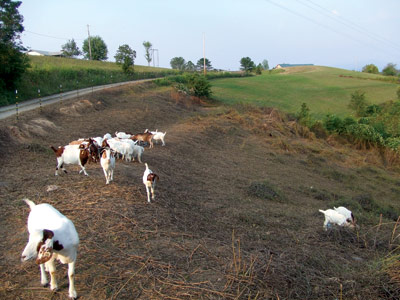So what was Copenhagen all about?
A half-dozen Asheville climate scientists and educators attended COP 15 — the Copenhagen climate conference — in December. And on Friday, Feb. 26, four of them will offer their perspectives in an event co-hosted by the Buncombe County chapter of the Western North Carolina Alliance and Asheville Green Drinks. The latter group, a weekly, self-described "networking party," hosts speaker/panel discussions at downtown Asheville's BoBo Gallery.

The panelists will include climate scientist Ned Gardiner of the National Oceanic and Atmospheric Administration; David McConville, co-founder of The Elumenati, a local design firm that delivered educational, immersive climate programming during the conference; Ellie Johnston, a UNCA student who represented world youth; and Michael Leahey, sustainability coordinator for the Asheville Hub Sustainability Task Force.
The program starts at 6 p.m. at BoBo Gallery (22 N. Lexington Ave. in Asheville). For more information, visit ashevillegreendrinks.com.
Feds drop animal ID program
Word is spreading via Twitter and small-farm listserves that the U.S. Department of Agriculture is dropping the National Animal Identification System, a proposed program to monitor the movement of all U.S. livestock. The plan encountered widespread resistance from small-scale farmers, who argued that it would bankrupt them, among other concerns.
At a Feb. 5 press conference, Secretary of Agriculture Tom Vilsack announced: "After concluding our listening tour on the National Animal Identification System in 15 cities across the country, receiving thousands of comments from the public and input from states, tribal nations, industry groups and representatives of small and organic farmers, it is apparent that a new strategy for animal-disease traceability is needed. I've decided to revise the prior policy and offer a new approach … with changes that respond directly to the feedback we heard."
The revised policy will apply only to animals moved across state lines. Administered by the states and tribal nations, it will encourage low-cost technology and "be implemented transparently through federal regulations and the full rule-making process." In the first steps toward a revised, flexible policy, the USDA will convene a forum for animal-health leaders and revamp the secretary's Advisory Committee on Animal Health "to address specific issues, such as confidentiality and liability."
Those were just a few of the concerns raised when the agency proposed the program about four years ago. Here's what an Xpress article about the proposal had to say back then (see "What the Bleat Do They Know?" March 29, 2006 Xpress):
"The National Animal Identification System, conceived in the wake of the mad cow disease scare, envisions a central database that would enable public officials to trace any animal in the U.S. back to its farm of origin within 48 hours. This, it's argued, would help keep sick animals out of the food system — or, in the case of a disease outbreak, get a quarantine in place.
The NAIS, a joint project of the U.S. Department of Agriculture and individual states, is voluntary for now. A draft plan, released last April, lays out a tentative timeline for phasing in the program. … At present, however, the plan calls for requiring anyone who keeps livestock — from alpacas to cattle to the casual chicken — to register their farm or other property with a unique, seven-digit 'premises ID' by 2008. And the following year, producers would have to go further, identifying any animals that might ever leave the property.
"I understand that you've got to have a license to have a gun," said Sherry Williams, who raises nearly 50 dairy goats, including La Manchas, at her Listening Eagle Farm near Marion. "But now they're telling me I have to have a license to farm? That's exactly what this is."
To view the entire article, go to www.mountainx.com/news/2007/0329farm.php/.
Send your environmental news to mvwilliams@mountainx.com, or call 251-1333, ext. 152.


Before you comment
The comments section is here to provide a platform for civil dialogue on the issues we face together as a local community. Xpress is committed to offering this platform for all voices, but when the tone of the discussion gets nasty or strays off topic, we believe many people choose not to participate. Xpress editors are determined to moderate comments to ensure a constructive interchange is maintained. All comments judged not to be in keeping with the spirit of civil discourse will be removed and repeat violators will be banned. See here for our terms of service. Thank you for being part of this effort to promote respectful discussion.